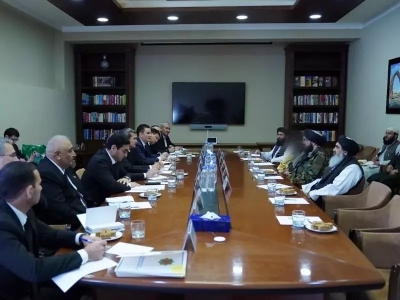By Aditi BhaduriNew Delhi, May 21: When the Taliban, with the support of Pakistan, and the blessings of both the US and Qatar, took charge in Kabul in August 2021, one of the first countries to greet them was neighbouring Turkmenistan.Turkmenistan shares a 744 km long border with Afghanistan.
Sitting on reserves of 265 trillion cubic feet, it is the sixth largest natural gas reserve holder in the world.
On August 30, Turkmen representatives, including from the Foreign Ministry met Taliban officials from neighbouring Faryab province to discuss strengthening the work of the Imamnazar-Akina checkpoint between the two countries.
On September 1, it rushed humanitarian aid to Afghanistan, becoming one of the first countries to do so after the Taliban took over the country.
The Central Asian country’s landlocked geography makes it dependent on neighbours for its economy – dependent entirely on its gas exports.Afghanistan’s “Heart of Asia” location, as well as its own energy needs makes it a valuable country for Ashgabat.
That is why, perhaps, Turkmenistan has been one of the most pragmatic of the Central Asian countries.
In stark contrast with neighbouring Tajikistan, for example, the gas rich country began engaging with the Taliban much before the fall of Kabul.In February 2021, Ashgabat officially hosted the first Taliban delegation headed by Mullah Abdul Ghani Baradar.
In a statement following the visit, which underscored the importance of infrastructure projects by Turkmenistan in Afghanistan, Turkmen Foreign Ministry highlighted that for many years the country had been extending significant support to the Afghan people, aiding the Afghan economy, particularly in such strategically significant areas such as energy, transport, and communication.
Turkmenistan had also been exporting electricity to the Northern regions of Afghanistan, some of which like northern Herat and Baghdis had long been controlled by the Taliban, even when the Ashraf Ghani administration was ensconced in Kabul.
Turkmenistan also wishes to export electricity to Pakistan and gas to both Pakistan and India.
More recently, Turkmenistan allowed the diplomatic representation of the Taliban to start functioning in the capital Ashkhabad, becoming one of the first countries to recognize the Taliban as the legitimate government of Afghanistan.
But now, the country seems to be implementing measures that can only be said to be influenced by the Taliban, unprecedented as they are in the region.And they are all directed at women.
In spite of the decades of existence within the Soviet Union, Turkmen society remains rather conservative.Yet, strides had been made in women’s empowerment — compulsory education of girls and women, women’s participation in the country’s workforce, in politics, and in most spheres of social life.
Post-independence, the country has also been known for eccentric policies formulated by its leaders.The first President, the now late Saparmurat Niyazov, who also gave himself the nomenclature Turkmenbasi (Father of all Turkmens), for instance, declared a day in honor of the water melon, the favourite and national fruit of the country.
Following in his footsteps, the second, now former President Gurbanguly Berdymukhamedov, banned the wearing of shorts in public places.Now his son, Serder Berdymukhamedov, who was recently sworn in as President and who is expected to lead Turkmenistan to make it more modern and liberal, has given the green light to a slew of measures regarding women and all of them have to do with personal choice.
Women have been asked to desist from wearing tight fitting clothes or clothes that reveal much skin.They have to wear long loose clothes, and the police can detain and fine them for wearing the wrong clothes.”Wrong clothes” also include blue jeans and white wedding dresses.In fact, these bans, though yet unofficial, apply to foreign women in the country too.
Women have been asked to refrain from makeup in public office as well as in public in general.They are forbidden to use false nails and eyelashes, dye their hair, use Botox, undergo cosmetic surgery, or get tattoos on themselves.
According to Radio Free Europe/Radio Liberty even those cosmetologists who provide such services run the risk of being fined and facing arrest, if found out.As a result, it is reported that dozens of beauty parlours across the country have ceased to function.There are also reports that in Ashkhabad at least 20 flight attendants have lost their jobs because they were suspected of using Botox and lip augmentation.
All these bans seem to be in tandem with those bans that the Taliban have once again begun imposing on women in neighbouring Afghanistan — to mandatorily cover their faces, not travel alone, without a male guardian, closing educational institutions for girls, and so on.
Furthermore, Turkmenistan has now begun imposing rules which forbid women to ride in private cars of men not related to them – in the CIS countries private cars often double up as taxis -, and also ban them from sitting in the front seat.These bans are unheard of in any of the former Soviet republics, even though those of the South Caucasus and Central Asia tend to be much more traditional and conservative, as compared to their Slavic counterparts.
Taxi drivers have been advised not to allow women to sit in front and traffic police are known to have stopped private cars carrying female passengers and asked for documents to prove that they are related to the driver.
Abortion is also banned in the country.
And since 2018 driving licenses have stopped being issued to women.
It is not clear what is driving these bans.
It could possibly be the furthering of tight state control over every aspect of people’s lives in a country where the internet remains restricted and social media banned.Turkmen women are amongst one of the most enterprising and strong women, it is to be seen how they will accept and process such control over some of the most personal and intimate aspects of their lives.
Yet, such Talibanesque measures are frightening for the region.On the day the Taliban took over Kabul Uzbek analyst Yuri Sarukhanyan said that the most dangerous aspect of the return of the Taliban to Kabul was the “Talibanization of societies”.How prescient those words are turning out to be!
(The content is being carried under an arrangement with indianarrative.com)
–indianarrative
#Afghanistan #Turkmenistans #shift #conservative #Islam #Delhi #Delhi #New Delhi #Bid #Honor #Asus #Axis
.






